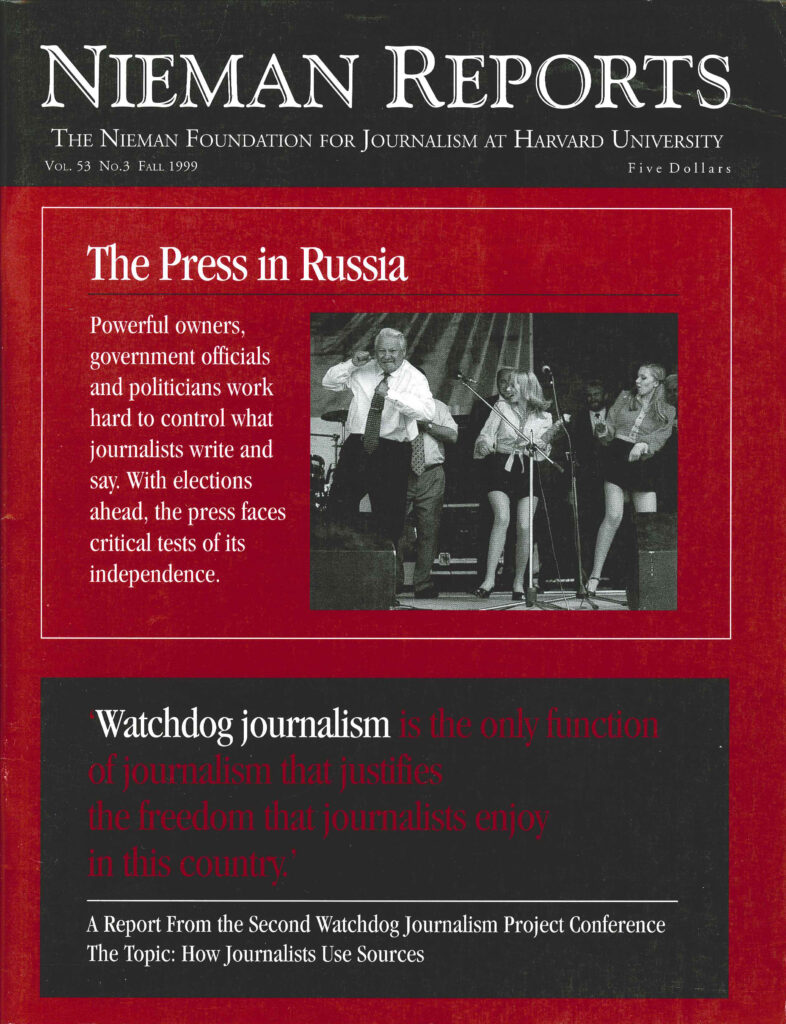Savvy newspaper readers know to be on guard when information in stories is attributed to anonymous sources. But what if a news organization relies on an unidentified informant and withholds that fact from readers? The public then is robbed of a precious opportunity to be skeptical.
A glaring case in point: Whitewater.
The 1996 prosecution of James and Susan McDougal by Independent Counsel Kenneth Starr featured testimony by FBI agent Michael Patkus. According to news stories at the time, Patkus testified that nearly $50,000 of a fraudulent $300,000 loan from David Hale to Susan McDougal was diverted to benefit the Whitewater Development Co., i.e., the Clintons. The “fact” of a tainted $50,000 benefit to the President dogged him thereafter in the press and became a major focus of attention in the Whitewater saga.
One small problem: There was no such testimony by Patkus.
In a nutshell, the so-called nearly $50,000 benefit to the Whitewater Development Co. was in two chunks. One chunk did not come from the corrupt $300,000 loan, nor did Patkus say it did despite press reports to the contrary. It came from another, apparently legitimate, bank loan to James McDougal a year earlier. The second chunk was only briefly in Whitewater’s name and did not benefit the Clintons.
So how did news organizations come to put words in Patkus’s mouth? They did it, I’ve recently learned, because they gave credence to what they were told privately by Starr’s deputies about the so-called benefit during the 1996 trial. This information was then incorporated into stories without informing readers that anonymous sources were at work.
More than two years later, Starr himself went public with the same erroneous recital in his impeachment testimony to the House Judiciary Committee. “Based on our investigation,” he told the Committee, “we now know that some $50,000 of that [$300,000 fraudulent] loan went to benefit the Whitewater corporation.”
When the Office of the Independent Counsel was prodded by me and Iowa’s Senator Tom Harkin, at my request, to explain the basis for Starr’s testimony, Deputy Independent Counsel Edward J. Page replied to Senator Harkin on April 13, 1999: “The testimony in the first McDougal trial served as the basis for Judge Starr’s testimony,” Page wrote. Sent a copy of Patkus’s actual testimony and asked to square it with his letter, Page was unable to offer a coherent explanation.
The rationale for use of unnamed sources is that it serves the public’s need for information it would not get otherwise. In this instance, the public was served up misinformation. Worse, the misinformation was given spin, by one party to a dispute, and presented as fact. Worse still, the press continuously concealed the existence of a confidential source, thus compounding its flimflam of readers.
If you are keeping score, score one for the Office of the Independent Counsel, which succeeded in spreading its slanted version of the facts widely; score one also for the press, which had another juicy scandal story. The losers: a deceived and deluded public.
Now, when the press is awash with concern about credibility, seems a good time for news organizations to level with the public about how they mishandled this story. However, such a confession would require members of the press to disclose that Starr deputies were confidential sources. And breaching a promise of confidentiality, of course, is considered a journalistic no-no. But it isn’t always.
The rock-bottom reason for source confidentiality is to benefit the public. It would be perverse if the promise of confidentiality became, instead, a device to hoodwink the public. Implicit in the press-source bargain is that news organizations will protect identities in return for trustworthy information. When sources fail to live up to their end of the bargain, the press ought to blow the whistle. Besides, when the Independent Counsel’s office went public with the same information it had earlier given reporters privately, it waived confidentiality for all practical purposes.
Anthony Lewis recently disclosed in his column the name of a confidential source in Starr’s office who had misled him regarding an unrelated matter. Lewis did it both because of the deceit and because he learned that the source had told the same distorted story, on the record, to Bob Woodward.
The Gannett Newspaper Division’s principles of ethical conduct put it this way: “All sources should be informed that the newspaper will not honor confidentiality if the sources have lied or misled the newspaper.”
Whether the expectation of honesty is implicit in the press-source relationship or whether it is spelled out explicitly to the source at the outset, it’s imperative that the press expose deception whenever possible. Otherwise, anonymous sources will enjoy a shield for duplicity. All the more reason, then, for journalists to come clean about their shoddy reporting on Whitewater.
Gilbert Cranberg, former Editor of The Des Moines Register’s editorial pages, teaches journalism at the University of Iowa.
A glaring case in point: Whitewater.
The 1996 prosecution of James and Susan McDougal by Independent Counsel Kenneth Starr featured testimony by FBI agent Michael Patkus. According to news stories at the time, Patkus testified that nearly $50,000 of a fraudulent $300,000 loan from David Hale to Susan McDougal was diverted to benefit the Whitewater Development Co., i.e., the Clintons. The “fact” of a tainted $50,000 benefit to the President dogged him thereafter in the press and became a major focus of attention in the Whitewater saga.
One small problem: There was no such testimony by Patkus.
In a nutshell, the so-called nearly $50,000 benefit to the Whitewater Development Co. was in two chunks. One chunk did not come from the corrupt $300,000 loan, nor did Patkus say it did despite press reports to the contrary. It came from another, apparently legitimate, bank loan to James McDougal a year earlier. The second chunk was only briefly in Whitewater’s name and did not benefit the Clintons.
So how did news organizations come to put words in Patkus’s mouth? They did it, I’ve recently learned, because they gave credence to what they were told privately by Starr’s deputies about the so-called benefit during the 1996 trial. This information was then incorporated into stories without informing readers that anonymous sources were at work.
More than two years later, Starr himself went public with the same erroneous recital in his impeachment testimony to the House Judiciary Committee. “Based on our investigation,” he told the Committee, “we now know that some $50,000 of that [$300,000 fraudulent] loan went to benefit the Whitewater corporation.”
When the Office of the Independent Counsel was prodded by me and Iowa’s Senator Tom Harkin, at my request, to explain the basis for Starr’s testimony, Deputy Independent Counsel Edward J. Page replied to Senator Harkin on April 13, 1999: “The testimony in the first McDougal trial served as the basis for Judge Starr’s testimony,” Page wrote. Sent a copy of Patkus’s actual testimony and asked to square it with his letter, Page was unable to offer a coherent explanation.
The rationale for use of unnamed sources is that it serves the public’s need for information it would not get otherwise. In this instance, the public was served up misinformation. Worse, the misinformation was given spin, by one party to a dispute, and presented as fact. Worse still, the press continuously concealed the existence of a confidential source, thus compounding its flimflam of readers.
If you are keeping score, score one for the Office of the Independent Counsel, which succeeded in spreading its slanted version of the facts widely; score one also for the press, which had another juicy scandal story. The losers: a deceived and deluded public.
Now, when the press is awash with concern about credibility, seems a good time for news organizations to level with the public about how they mishandled this story. However, such a confession would require members of the press to disclose that Starr deputies were confidential sources. And breaching a promise of confidentiality, of course, is considered a journalistic no-no. But it isn’t always.
The rock-bottom reason for source confidentiality is to benefit the public. It would be perverse if the promise of confidentiality became, instead, a device to hoodwink the public. Implicit in the press-source bargain is that news organizations will protect identities in return for trustworthy information. When sources fail to live up to their end of the bargain, the press ought to blow the whistle. Besides, when the Independent Counsel’s office went public with the same information it had earlier given reporters privately, it waived confidentiality for all practical purposes.
Anthony Lewis recently disclosed in his column the name of a confidential source in Starr’s office who had misled him regarding an unrelated matter. Lewis did it both because of the deceit and because he learned that the source had told the same distorted story, on the record, to Bob Woodward.
The Gannett Newspaper Division’s principles of ethical conduct put it this way: “All sources should be informed that the newspaper will not honor confidentiality if the sources have lied or misled the newspaper.”
Whether the expectation of honesty is implicit in the press-source relationship or whether it is spelled out explicitly to the source at the outset, it’s imperative that the press expose deception whenever possible. Otherwise, anonymous sources will enjoy a shield for duplicity. All the more reason, then, for journalists to come clean about their shoddy reporting on Whitewater.
Gilbert Cranberg, former Editor of The Des Moines Register’s editorial pages, teaches journalism at the University of Iowa.



